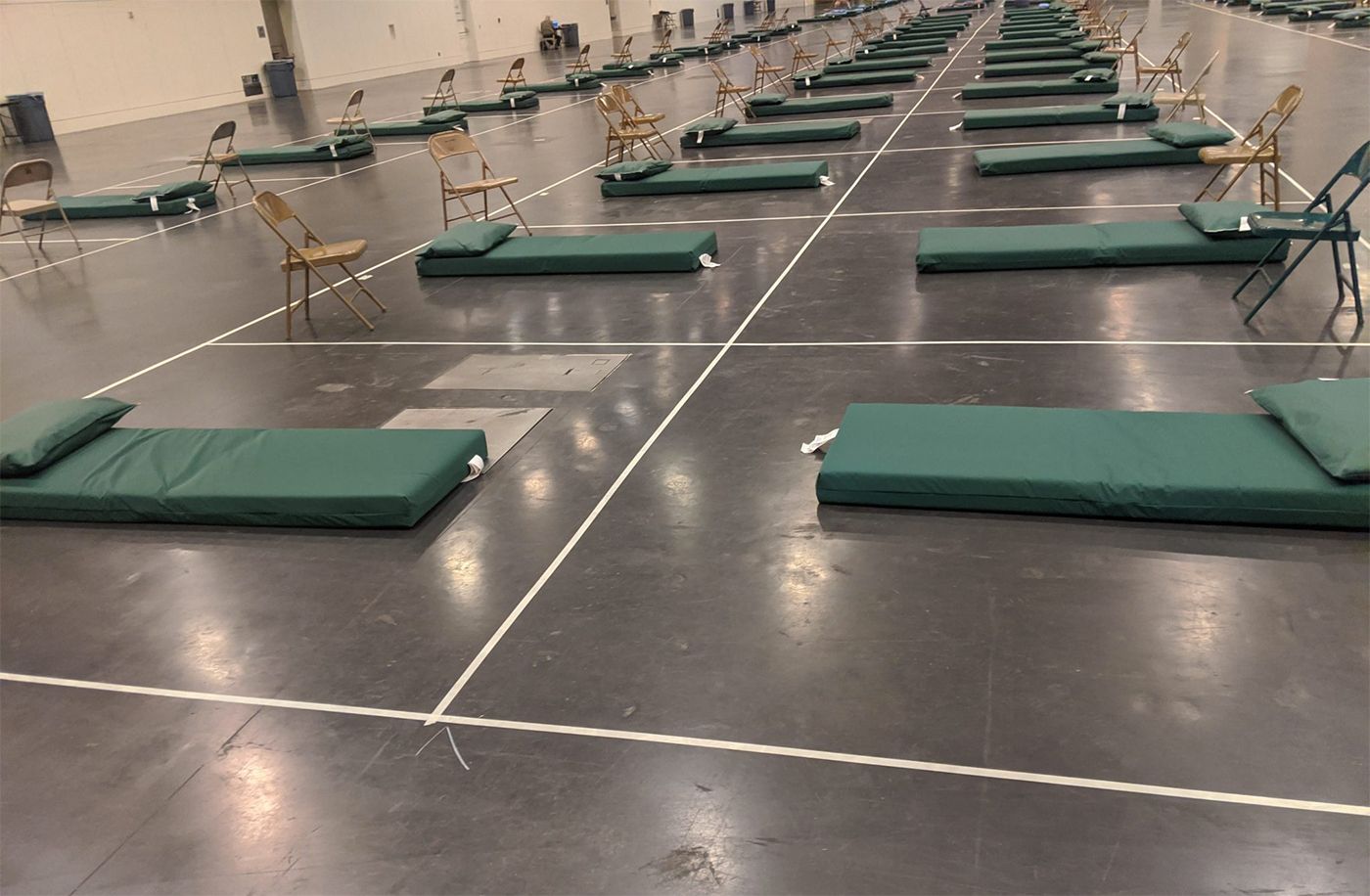The Moscone Center and the Palace of Fine Arts have been transformed into ersatz homeless shelters with bed mats on the floor and taped-out lines for minimal social distance. After some photos came out of the grim Moscone setup, several SF supervisors once again criticized the mayor for not housing the homeless in hotels instead.
Mayor London Breed gave a virtual press conference Friday, following the report of the first confirmed case of COVID-19 in a homeless Navigation Center resident, explaining that the city could not afford to use leased hotel rooms to house every person currently living on the street because rooms needed to be reserved for those who were sick, especially vulnerable, and for healthcare and frontline workers who needed to self-quarantine. "We are not going to be able to solve our homeless problem in San Francisco with this crisis," she said.
But as Street Sheet is now reporting, the alternative does not appear especially safe from a public health standpoint, with hundreds of people potentially sharing a single indoor space. A source shared the following photo of what the Moscone Center shelter setup looks like, with 390 bed mats, before many people have started sleeping there.

San Francisco Human Services Agency Director Trent Rhorer tells Street Sheet that it wouldn't be "fiscally prudent" to give a hotel room to every homeless person, and "there is no medical need to isolate this population in hotel rooms." Reiterating what Breed said last week, only those who have already turned up positive for COVID-19 and do not need hospitalization, or those who are 60 years old or older or otherwise vulnerable, will be eligible for hotel shelter.
Update: As of Monday, Mayor London Breed announced that Moscone West is being reconfigured for less capacity, and will now be reserved only for those who test negative for COVID-19, and those who have already been quarantined for two weeks in hotels with the virus and are recovering, in order to free up hotel rooms for use by others. Rohrer further clarified that the city currently has 945 rooms in eight SF hotels for this purpose, and the current estimated need to house the most vulnerable homeless population is 500 rooms.
Supervisor Catherine Stefani sent out a message to constituents Sunday explaining that the indoor spaces of the Palace of Fine Arts would similarly become a temporary homeless shelter, taking in its first residents later this week. "At capacity, it will house 162 people in a socially distant and responsible way," Stefani explains. "That means making sure the facility is not overcrowded and is cleaned with extreme frequency. It also means making sure that everyone is screened for COVID-19 symptoms every time they enter the premises." She further said she had gotten a commitment from the city to use "local neighborhood food vendors to provide meals as often as possible" at the shelter, in order to support Marina District restaurants.
But while getting people off the street may be admirable, there is epidemiological evidence to suggest that the virus is spread more readily in indoor spaces — so the best that these emergency shelters are doing is giving more space between beds than the city's existing shelters can provide. Street Sheet's anonymous source says "The city is totally desperate and they don’t know what they’re doing," and "None of the supervisors have visited the [Moscone] site."
48 Hills notes that hotels are accepting $70 per night from the city for each hotel room, and this is far cheaper than what an ICU bed would cost if a homeless person became gravely ill ($5,000 per night). And Supervisor Hillary Ronen has said that there is federal money to cover the cost of hotel rooms for anyone who turns up positive for the virus, who's especially vulnerable to being a severe case, or who's been exposed to someone who has — and state and local funds are likely able to cover costs for the rest of the needed rooms.
And Supervisor Matt Haney tells 48 Hills, after seeing the Moscone West photos, "This looks exactly like the places we don’t want people in." (In China, such gymnasium-style shelters were used to isolate positive COVID-19 cases all in one place, until they could recover.)
Street Sheet cites a recent study that suggested the homeless are twice as likely than the rest of the population to be hospitalized from the coronavirus and two to three times more likely to die from it, in part due to the average age of homeless people in California, and to the physical deterioration that comes with street life and exposure to the elements.


